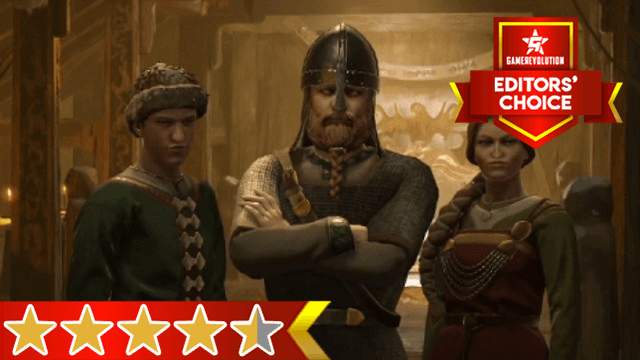Crusader Kings 3 review for PC. It’s easy to confuse Crusaders Kings for a series that’s only about stats and strategy. Those are two crucial aspects, but at its heart, Crusader Kings is about stories. Crusader Kings 3 brings that to the forefront, with more characterization options, events, and a new UI that makes the whole thing much more pleasant to handle.
Despite the added user-friendliness, Crusader Kings 3 is still far from a choose your own adventure game. It remains true to its grand strategy roots and retains its niche position in the hierarchy of gaming. However, the presentation has changed just enough in the positive direction that CK3 will likely draw many players who saw the series as unapproachable before.
I didn’t play Crusader Kings 2 extensively. I dabbled but never could get into it. Somehow, I did buy all the DLC at some point, though. I’m approaching this review from a relatively laymen’s standpoint. I’ll be making some general comparisons between CK2 and CK3, but for the most part, I’ll be looking at the game from the perspective of a newcomer.
Yourstory
Crusader Kings 3‘s two start points, 867 and 1066 AD, both offer an opportunity to take the reigns of anyone holding a Count, Duke, or King equivalent title during at those times. The map stretches from the Atlantic, and includes the whole of Europe, the northern third of Africa, and stretches all the way through Asia to around halfway through China. This gives you an immense amount of starting points.
When choosing a starting character, there are tons of factors that go into what their playstyle will be. Religion, government type, foreign and internal relations, and a character’s traits all influence what’s expected of a ruler, and there’s a delicate balance between keeping your vassals happy and achieving your goals.
You’re not just beholden to your nation in Crusader Kings 3. This game introduces a new dynasty system that allows you to influence the world through your familial relationships. More than likely, your family will disperse throughout neighboring countries as you marry them off to gain crucial alliances. However, blood is thicker than water, and you can use your influence as Dynasty Head (as long as you don’t lose that position) to make your family do your bidding.
These relationships between liege and vassal, and dynasty and family can be incredibly confusing for new players. However, it’s through these interlocking systems that much of the allure of the game comes through. Your character’s life unfurls as a drama, with strategy and fate determining their history. You’re not just playing as an abstract name, and it’s not hard to develop an attachment to the people that make up your medieval realm.
Ebb and Flow
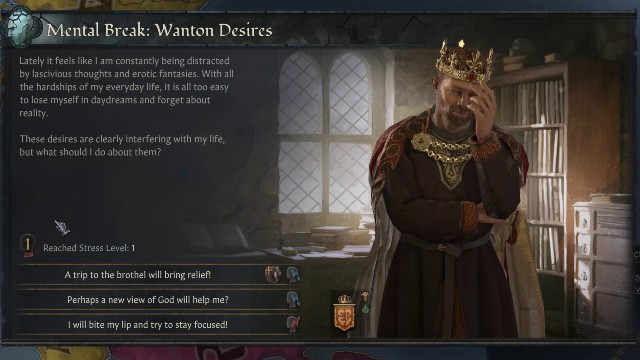
Not everything in this CK3 is random. While there are plenty of choose-your-own-adventure moments in which you’ll need to react to situations, you have a lot of control over your destiny.
Lifestyles allow you to choose from one of five categories that enable you to gain experience and unlock perks. These categories are tied to one of your character’s five stats: diplomacy, martial, stewardship, intrigue, and learning. Each category also includes three different focuses that give you a set of permanent passive buffs and three different skill trees which contain related perks. If you complete a skill tree, you can unlock a permanent positive trait that can help counterbalance any negative traits they may have.
The Lifestyle system gives you a focal point for your play style and gives you the flexibility to build a character without depending on outside influences. You are free to switch Lifestyles and focuses with some caveats, so you’re not stuck in one category for the entire life of your player. You may start by wanting to handle things diplomatically, and decide later to become a great warrior. Each Lifestyle gives you experience in that category, so even if you take control of a character with low Martial skill, they can still become a skilled fighter in time.
Your character’s expertise also helps to influence the development of their children. However, CK3 is very much nurture over nature, so you can get a head start on building your heir’s talents by tutoring them properly. This game is all about the long con, so it’s wise to have your heir train in the Lifestyle choice you wish to have for them early on. Ideally, by doing so, when your character dies of old age (or Lover’s Pox), they’ll have already picked up some perks from the Lifestyle you steered them into.
The Lifestyle system has a significant effect on the player character and their heir since they’re the ones you control directly. However, you can also guide family and members of the court in the direction you want since every person in the game has their own stats and Lifestyle choices.
Heiring Grievances
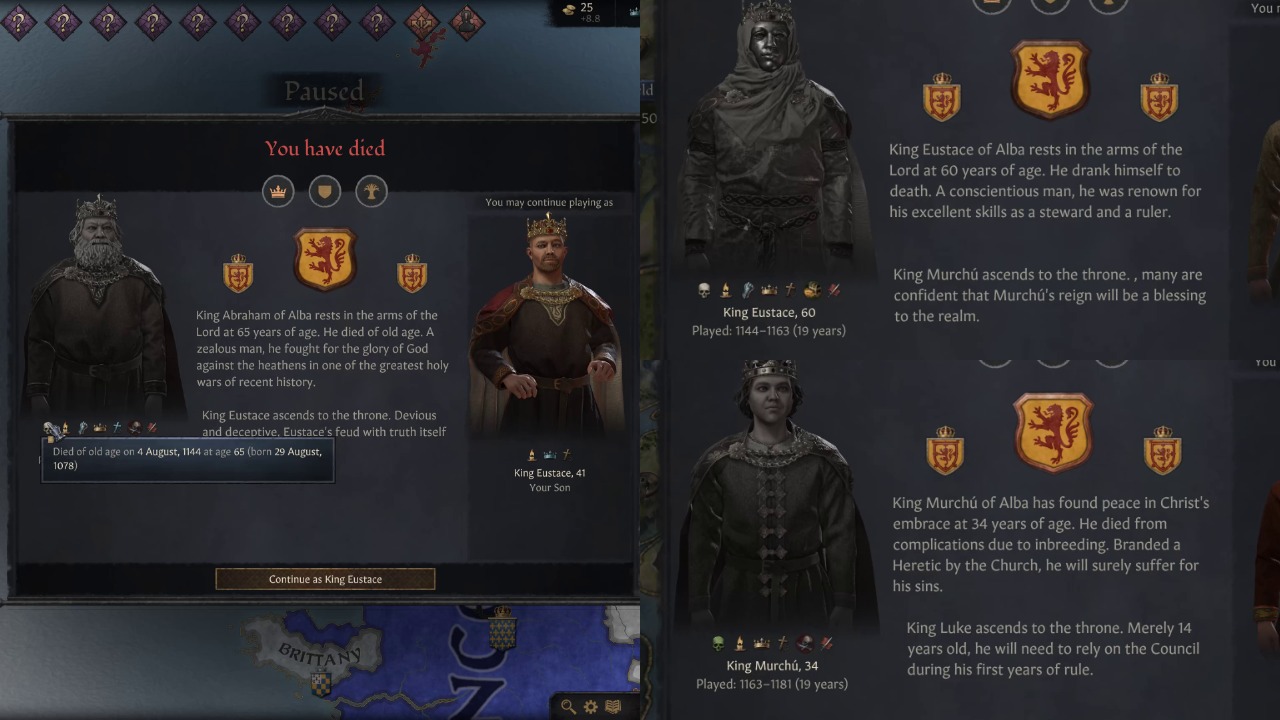
Life is fleeting, and when your ruler dies, you’ll begin playing as their heir. This doesn’t have to be a bad thing. If you play your cards right, your heir will already have some of their Lifestyle skill tree built up, and they’ll have the potential to be even greater than the previous ruler. Unfortunately, that’s not always the case.
For whatever reason, it seemed like every time my heir rose to power; everyone hated them. Even when I played as a much-beloved king, whose court and council thought the world of, they just couldn’t stand his heir. Sometimes this sort of thing can be explained by negative traits and status effects. If you have an heir that’s inbred, sadistic, shy, and a lunatic, people aren’t going to be a huge fan. However, you’ll likely find that even when you have the ideal heir, people are not going to start as fans when they take the throne.
Having a ruler die can also divide your lands in a non-favorable way. Depending on the form of succession in your nation, you can stand to lose quite a bit of territory when you switch over to the heir. This can be mitigated and eliminated through various methods, but plan on losing land early on if you can’t achieve at least a kingdom-level title that you can pass to your heir.
All in the family (or maybe not)

Family is everything in Crusader Kings 3. A significant burden on a medieval noble was providing an heir, and that’s true in this game as well. However, the job isn’t done there. Marriages can provide alliances that can make or break your offensive or defensive operations. At a broader scope, putting your family in key positions can act as a counter to internal factions that may want to do you harm.
On the flip side, your family can be your worst enemy in this game. When your first character dies, you take over as their heir, and when they die, you’ll play as their heir, and so on. Depending on your form of succession, a character might have to split their titles among family members when they die, which is frustrating in and of itself because it leaves your heir with only a fraction of the area you controlled as their predecessor.
Even if you end up with what most people think of as a kingly succession law (male-line primogeniture), your pesky family will end up with claims to your titles. It’s interesting when playing to see just where things will go. You can do your best to keep your family loyal, but sometimes you just get poor luck.
Of course, the middle ages were a very strange time, so with many cultures and religions in the game, it’s a-ok just to marry your relatives. You lose alliance opportunities, but when your family tree is a telephone pole, you gain the stability of keeping hereditary claims to your titles to a minimum. Of course, the game keeps track of this so disaster could strike from elsewhere if you go this route. Characters have a genetic makeup which predisposes them to positive and negative traits. Like in real life, these are hereditary, and interbreeding within your house can cause these to express themselves more regularly.
On the flipside, seeding your family far and wide can be beneficial as well. You’ll have the opportunity to form many alliances, and you can marry to generate positive traits in your heirs. Marrying outside of your family also allows you to rack up de jure claims. Nothing feels better than sitting there chilling and having someone die and leave you half a country. These claims can also help you to gain prestige and power over generations. Skillful planning can allow you to take over kingdoms through marriage without raising a blade. However, eventually, someone will come for you, and you’ll have to raise your banners.
Get Medieval on them
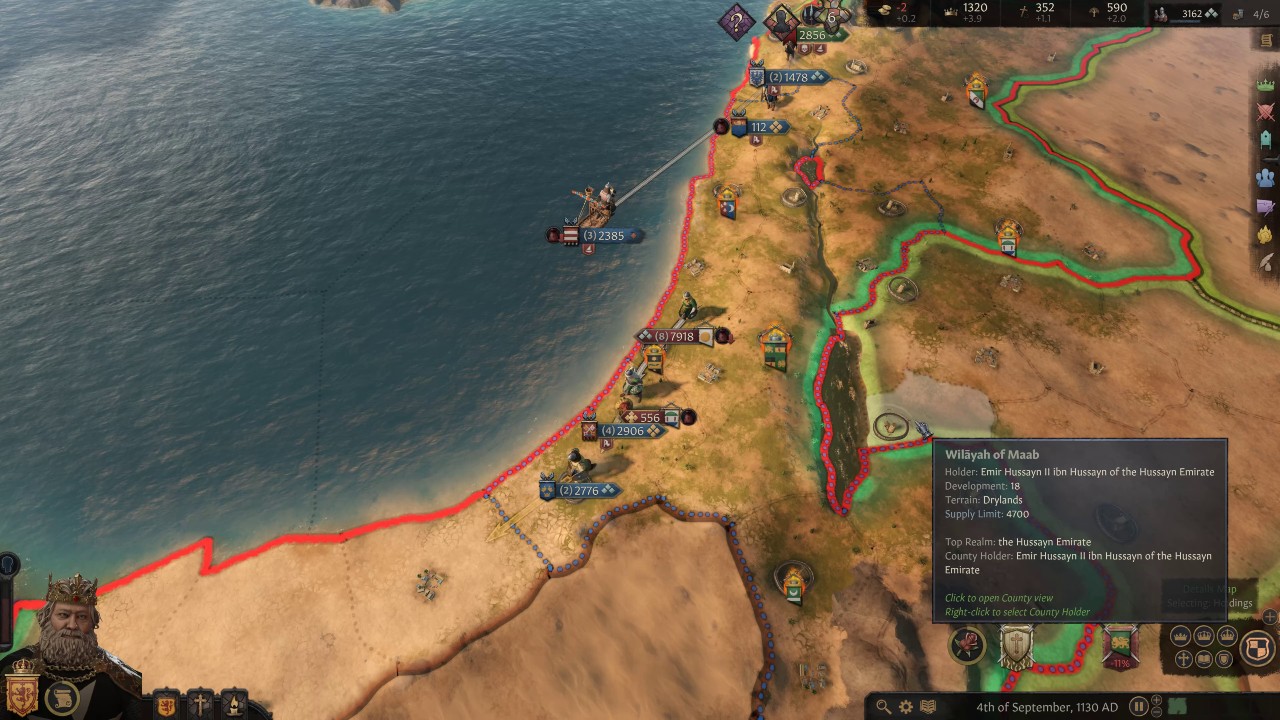
Regardless of how peaceful or sneaky you are, combat is an inevitability. From peasant revolts to wars to claim nations, armies are your primary method of force projection and defense in Crusader Kings 3.
There have been some good and bad changes to the way your military works in CK3. I believe this will be the most divisive area of the game for fans of previous games. You no longer have retinues. Your primary armed forces are drawn from levies. Each of your nobles pledges a certain percentage of their levies for your army, which can be increased by Lifestyle perks, kingdom policies, county buildings and upgrades, and various other methods.
If levies are the bread of your armies in CK3, men-at-arms are the meat. These specialized units are raised and financed by you directly. They take the place of retinues in the way that you’ll always have access to them, even if every noble in your kingdom were to rebel. Men-at-arms can be simple light infantry, or more specialized units like archers, cavalry, or siege equipment. Some of these units are simply professional soldiers with no strengths and weaknesses. Others fight better on some terrain and worse on another. Some specialize in combating specific units, but are weaker to others.
The men-at-arms system adds some nuance to combat that makes you consider your army’s composition and what terrain you’re fighting on. Adding to this is the addition of knights. Named characters in your court can be knighted to fight alongside your armies and bring their prowess to your cause. Knights can help defend against other knights and are also devastating against enemy men-at-arms and levies.
However, there has been a simplification of deployment in CK3 that lowers the realism a bit. Instead of raising your levies independently, your forces meet as one combined unit at a rally point, which is your capital by default. It can take a few days to muster your full forces, but they’re not in any danger when you’re doing so. This means most nations will just control one or two large armies as soon as any war starts. This isn’t entirely atypical compared to CK2, but there’s no more blitzing enemy kingdoms to take out a few groups of levies before they combine into the main force.
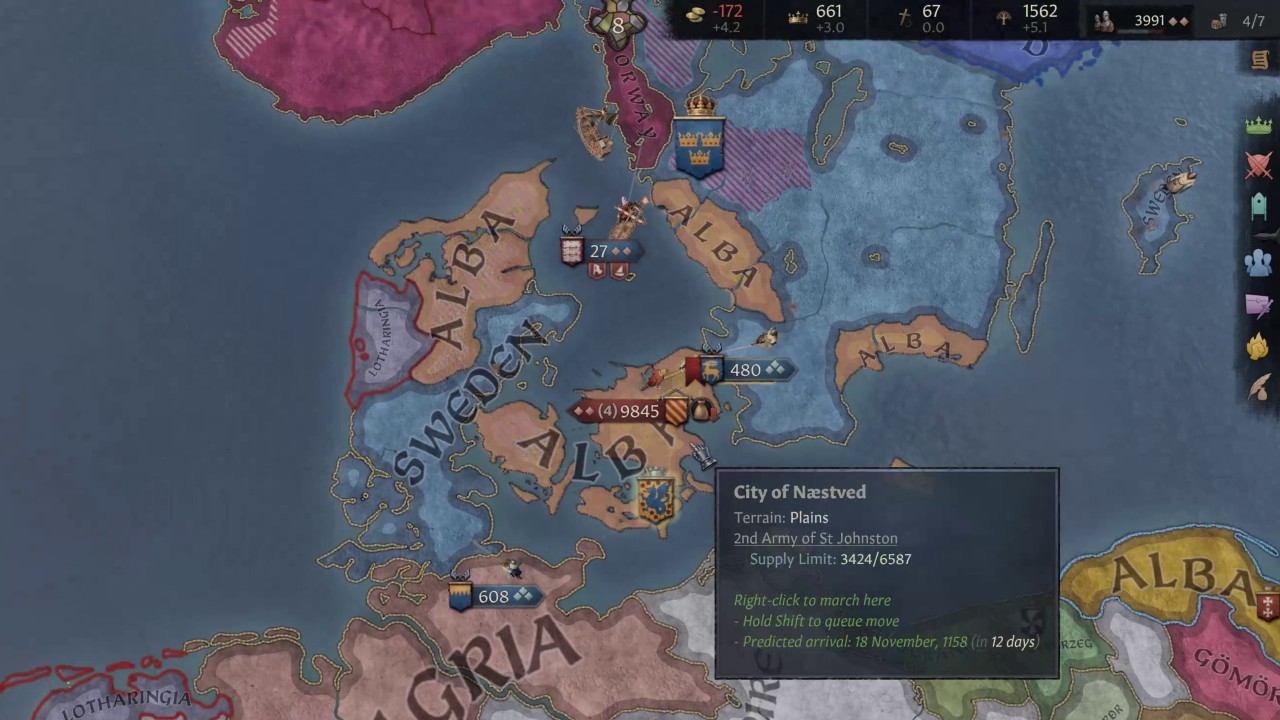
A fault I found in the military system of CK3 is that it never gives you useful information on how many soldiers a target has access to. When you go to declare war, the game gives you the number of troops a foe has based on their forces and any of their allies. However, it doesn’t take into account the likelihood that they’ll call in mercenaries or partner with another country mid-war. This means the game might rate an enemy’s forces as being vastly inferior to yours, and as soon as you declare war, the Petty Kingdom of Who Cares will call up a 20,000 troop army and stomp you. This happened to me repeatedly, and I couldn’t figure out any real way around it.
The only safe way to declare war is to either have a large enough army and numerous allies as to make your force so overwhelming that there’s no possibility of defeat, or ensure that the foe you’re attacking is broke, has no daughters or sons to marry off, and has no allies of any significance. Even then, I’ve found the AI can somehow pull some hat trick and gather an army significantly larger than what they should be able to.
Whether by design or not, I felt like using my military was the last resort in CK3. If you have a ruler with which you’ve heavily invested in martial skills, your court and council love you, and you have powerful allies, it’s possible to just kill your way across Europe and Asia. However, unless circumstances are perfect, you’ll need to be very wary when using the sword to build your empire.
Crusader Kings 3 Review | The final verdict
Crusader Kings 3 takes the massively-popular formula of its predecessor and distills it into a much more accessible and attractive package. The drama is even better, the plots sneakier, and it’s a game you can play for hundreds of hours without getting tired of it.
This review only skims a bit of what the game offers, as it’s incredibly complex. However, I feel like CK3 introduces its various systems in a much easier-to-grasp way than CK2 did. So, if you’ve been intimidated about Paradox’s grand strategy games, CK3 makes a new beginning that continues to provide all the fun of medieval intrigue, drama, and history, while making it a lot easier to pick up and play.
For longtime fans, the facelift will welcome, and you’ll appreciate seeing characters age, get injured, and be affected by events around them in their 3D portraits instead of just being a child, then instantly looking like a 45-year old when they come of age. I can’t wait to see where Paradox takes CK3, and I’m totally ready to spend $100s for DLC that makes this already complex game even deeper.
-
Markedly improved UI.
-
Amazing, emergent gameplay.
-
Maximum replayability.
-
Approachable for newbies, but retains the complexity for longtime fans.
-
Game gives some weird estimates for enemy military size when declaring war.
-
Can be confusing to quickly tell how distant relatives are related to you without looking at the dynasty chart.
